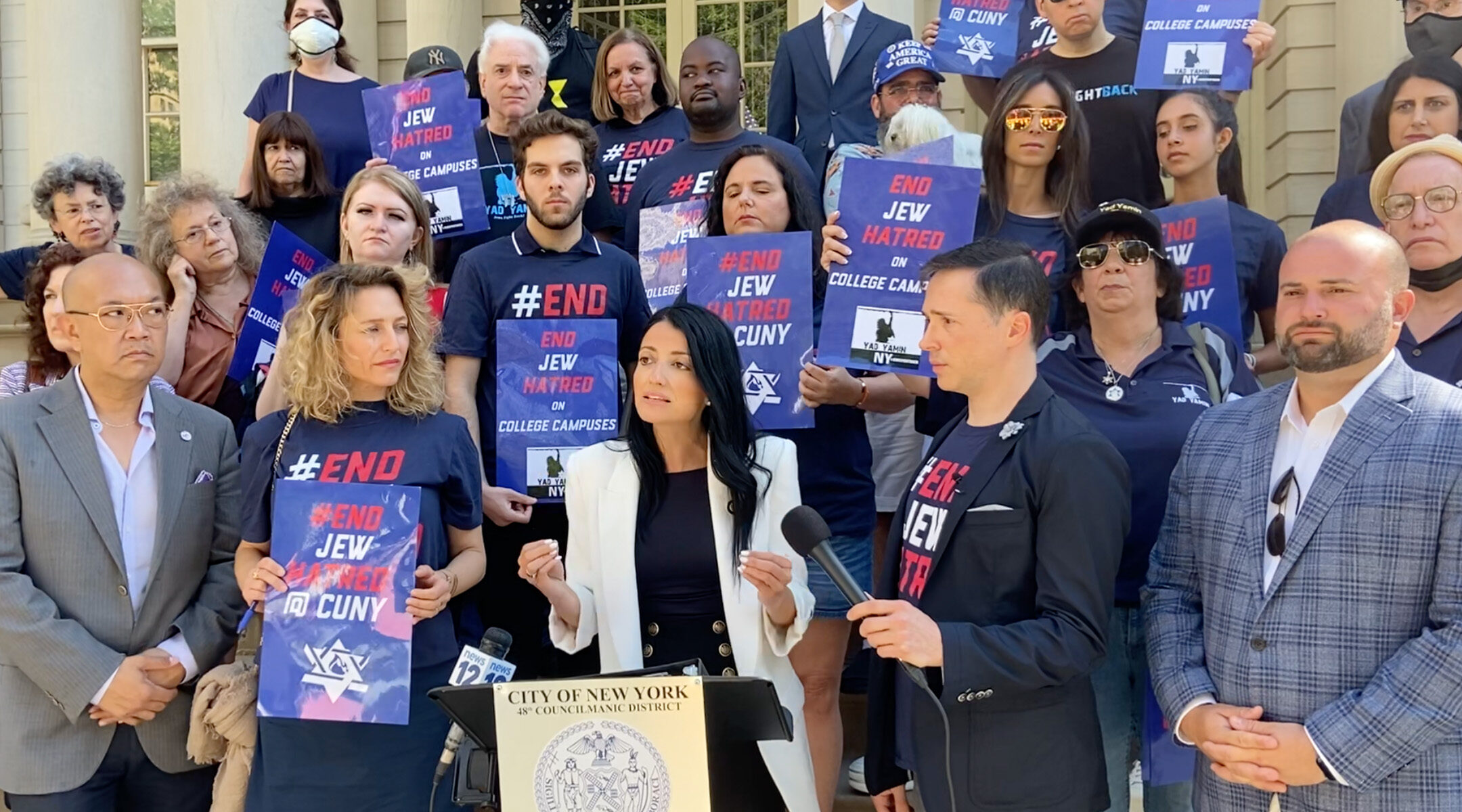(New York Jewish Week) — City University of New York Chancellor Félix V. Matos Rodríguez was a no-show at a City Council hearing talking about antisemitism at the university system.
Dozens of witnesses gave testimony to the Council Committee on Higher Education Thursday, describing a culture of hostility to Jews and Israel at CUNY and accusing the administration of doing too little to stop it.
Representing CUNY at the hearing were three other administrators appearing via Zoom, including Glenda Grace, Senior Vice Chancellor For Institutional Affairs, Strategic Advancement and Special Counsel, who sparred with Council members throughout the hearing.
In one pointed exchange, she was questioned about the Boycott, Divestment and Sanctions movement targeting Israel by Brooklyn Council member Inna Vernikov, a frequent critic of CUNY. Two weeks ago, Vernikov pulled $50,000 in funding from the CUNY School of Law after its faculty council endorsed a resolution supporting the BDS movement.
Vernikov asked Grace if she would denounce the BDS movement.
“I think we’re clear on where we stand on BDS,” Grace said. “We’ve made a number of statements on BDS.” As recently as May, Matos Rodríguez issued a statement saying CUNY “does not support and to be clear cannot participate in BDS activities.”
Vernikov said, “Very simple question, will CUNY denounce BDS, yes or no?”
Grace, visibly flustered, answered, “We don’t believe in it. We think it’s wrong. We can’t engage in it. That to me is denouncing, but if that’s not denouncing to you, we disagree.”
In recent years, students and faculty at CUNY-affiliated Baruch College, John Jay College of Criminal Justice, Queens College and Hunter College, among others, have complained about anti-Israel resolutions passed by the campus-wide faculty union, as well as an anti-Israel climate on their individual campuses. Some anti-Israel activism has crossed the line into antisemitism, the critics say.
Antisemitism watchdog group AMCHA wrote in a statement before its representative testified that they have logged more than 150 antisemitic incidents on 11 CUNY campuses since 2015, when the group began tracking.
It also said that more than 60 of these incidents directly targeted Jewish students for harm, including swastikas, bullying and suppression of movement, assembly and denigration.
Tzvia Waranker, a student at CUNY, spoke about an interaction with another student who had “antisemitic beliefs.”
“[The student] told me that all Jews are rich, control the world, Israelis kill babies, Jewish women are greedy and clingy,” Waranker said. “Then he began to question my hair.”
She added that CUNY faculty and the administration don’t fully understand the problem of antisemitism on campus.
“I don’t think CUNY understands what antisemitism is and how it impacts the students,” Waranker said.
Zachary Beeri, a graduate of the City College of New York, said other campus clubs would refuse to interact with Hillel because of the Jewish group’s stance on Zionism.
“In my personal interactions with members of Students for Justice in Palestine, they openly did not regard Hillel as representative of the Jewish community on campus,” Beer said.
Council members in attendance included Kalman Yeger of Brooklyn and Gale Brewer of Manhattan.
Eric Dinowitz, the chair of the Higher Education Committee and of the Council’s Jewish Caucus, said in the hearing that with antisemitic hate crimes on the rise, the city’s public college leadership should “visibly be front and center.”
“The lack of personal participation sends the absolute wrong message and we must do better,” Dinowitz said, referring to Matos Rodríguez’s absence and the other administrators appearing only via Zoom. “I am deeply disappointed.”
In response, Grace said that while CUNY takes pride in support of free speech, the campus “unequivocally denounces antisemitism in every form.”
She also added that CUNY students, faculty and other groups are “free to voice opinions on a wide range of issues, but speak for themselves when they do so.”
“Positions they express are entirely theirs and do not represent the views of the City University of New York,” she said.
Vernikov, who also is Jewish, announced Matos Rodríguez’s absence, saying she received an email saying he would not be attending.
CUNY did not respond to a request for comment as to why the chancellor was not able to attend the hearing.
“I would love to have a hearing where he is present,” Vernikov said in a press conference before the hearing. “I will not stop until I have the chancellor in front of me.”
She called the chancellor “cowardly” for not showing up, adding that it is “an insult to the Jewish community of New York.”
During the hearing, Vernikov shared ideas to help combat antisemitism on campus, including sensitivity training and consequences for those who harass, intimidate or discriminate against Jewish students.
She also called for the adoption of the International Holocaust Remembrance Alliance’s definition of antisemitism across all CUNY campuses. Gov. Kathy Hochul issued a proclamation earlier this month accepting the IHRA definition, although the definition has been criticized by some left-wing and civil liberties groups, who say it inhibits criticism of Israel.
The New York Jewish Week brings you the stories behind the headlines, keeping you connected to Jewish life in New York. Help sustain the reporting you trust by donating today.





